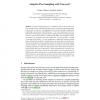Free Online Productivity Tools
i2Speak
i2Symbol
i2OCR
iTex2Img
iWeb2Print
iWeb2Shot
i2Type
iPdf2Split
iPdf2Merge
i2Bopomofo
i2Arabic
i2Style
i2Image
i2PDF
iLatex2Rtf
Sci2ools
128
click to vote
EUROPAR
2009
Springer
2009
Springer
Adaptive Peer Sampling with Newscast
Abstract. The peer sampling service is a middleware service that provides random samples from a large decentralized network to support gossip-based applications such as multicast, data aggregation and overlay topology management. Lightweight gossip-based implementations of the peer sampling service have been shown to provide good quality random sampling while also being extremely robust to many failure scenarios, including node churn and catastrophic failure. We identify two problems with these approaches. The first problem is related to message drop failures: if a node experiences a higher-than-average message drop rate then the probability of sampling this node in the network will decrease. The second problem is that the application layer at different nodes might request random samples at very different rates which can result in very poor random sampling especially at nodes with high request rates. We propose solutions for both problems. We focus on Newscast, a robust implementation...
Distributed And Parallel Computing | EUROPAR 2009 | Peer Sampling Service | Quality Random Sampling | Random Sampling |
Related Content
| Added | 26 May 2010 |
| Updated | 26 May 2010 |
| Type | Conference |
| Year | 2009 |
| Where | EUROPAR |
| Authors | Norbert Tölgyesi, Márk Jelasity |
Comments (0)

